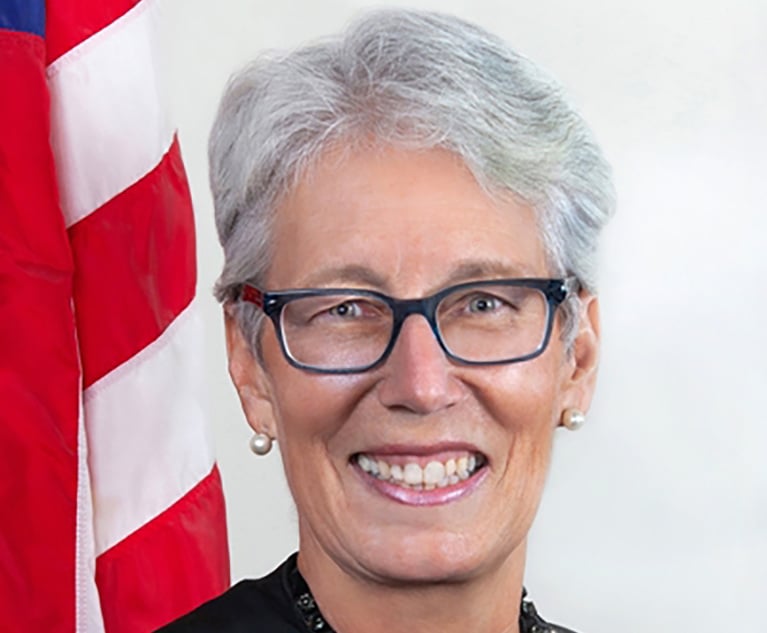Third Circuit Strikes Del. Courts' Party-Balance Mandate as Unconstitutional
In a precedential opinion, a three-judge panel of the Philadelphia-based appeals court ruled that the political balancing requirements, long a staple of the state's judicial nomination process, violated the First Amendment.
February 05, 2019 at 03:58 PM
6 minute read
The original version of this story was published on Delaware Law Weekly

The U.S. Court of Appeals for the Third Circuit on Tuesday struck down provisions of the Delaware Constitution mandating balance between the state's major political parties on key state courts, saying that they unconstitutionally barred registered independents and third party members from serving as judges.
In a precedential opinion, a three-judge panel of the Philadelphia-based appeals court ruled that the political balancing requirements, long a staple of the state's judicial nomination process, violated the First Amendment by restricting government employment based on party affiliation.
The ruling applies to Delaware's Supreme and Chancery courts, which both play an outsize role in developing American corporate law, as well as the Superior Court, whose membership was required by law to be composed entirely of judges from the state's two dominant political parties. It does not apply to the Family Court or Court of Common Pleas.
In its ruling, the Third Circuit held for the first time that judges do not qualify as policymakers to fit a narrow exception to the First Amendment that allows party affiliation to be taken into account when considering applicants for certain governmental positions.
Judge Julio M. Fuentes, writing on behalf of the panel, said the policy-making exception was meant to ensure that elected officials could install loyal employees to enact an administration's policy agendas. But judges, on the other hand, are expected to make decisions in the individual cases before them, without regard for partisan agendas based on political interests.
“Judges simply do not fit this description,” Fuentes wrote in a 34-page opinion.
“Independence, not political allegiance, is required of Delaware judges,” he said.
The ruling threatened the state's 120-year-old tradition of nominating judges under the party-balance provisions, which was first adopted in 1897. In Delaware, the governor considers judicial nominees based on the recommendations of an independent judicial nominating commission.
Until Tuesday, governors were required to ensure that no more than a bare majority of the Supreme, Chancery and Superior courts was represented by one political party, with the remainder of the courts' membership representing the other prevailing party.
Historically, that meant that governors would sometimes have to nominate judges from the opposite political party in order to maintain balance on the bench between Democrats and Republicans.
Proponents of the practice have said that it safeguards a fair, independent and impartial judiciary that attracts top talent to serve among its ranks. However, critics have argued that it improperly excludes independents and creates the impression the state's judiciary is tinged with political bias.
In February 2017, a retired New Castle County lawyer named James R. Adams challenged the provisions in federal court. A longtime Democrat, Adams had switched his official party affiliation from Democrat to independent earlier that year and claimed he was prevented from applying for open judgeships because he did not belong to either major political party.
A U.S. magistrate judge that December sided with Adams, but allowed Gov. John Carney to continue nominating judges while his office appealed to the Third Circuit. Both sides argued at length during oral arguments in September over the role judges play in a constitutional democracy.
David C. McBride, an attorney for Carney, said that judges should qualify as policymakers because they set the judiciary's budget and create rules of civil and criminal procedure. Delaware judges, he argued, are also tasked with crafting new policy, especially in the area of corporate law, and he pointed to “literally dozens” of decisions that have determined the fiduciary duties of corporate directors.
On Tuesday, Fuentes said the role of judges in creating policy was limited to the specific cases in front of them, and he noted that judges in Delaware are barred from ruling based on their own personal or political beliefs.
“Put simply, while judges clearly play a significant role in Delaware, that does not make the judicial position a political role tied to the will of the governor and his political preferences,” Fuentes said. “As such, the policymaking exception does not apply to members of the judicial branch.”
David L. Finger, who represented Adams, welcomed the ruling Tuesday as a win for both his client and the judicary.
“This expands the potential pool of highly qualified people to be judges,” he said.
Finger said that he hadn't talked to his client about specific plans, but said Adams would likely consider for applying for future openings as an independent.
“I'm certain that he would like to be considered for a judgeship,” said Finger, of Finger & Slanina. “I'm sure he would give any opening some serious consideration.”
McBride, a partner with Young Conaway Stargatt & Taylor, was not immediately available to comment Thursday afternoon, and a spokesman for Carney said his office was “still reviewing the opinion.” The spokesman did not comment on how the ruling would affect judicial nominations going forward or on any plans to appeal.
Tuesday's ruling did put the Third Circuit at odds with the Sixth and Seventh circuits, both of which had previously ruled that judges are policymakers. Fuentes, however, said that those decisions conflate a governor's ability to consider the political beliefs of state employees with the ability to condition government employment on party loyalty.
“Under our case law, discrimination based on political patronage is only actionable where the employee's political affiliation was a 'substantial or motivating factor in the government's employment decision,'” he said.
“Because the approach of the Sixth and Seventh circuits would allow governors both to weigh an individual candidate's political beliefs and to condition judicial positions on party allegiance, we must disagree.”
Fuentes was joined by Judges Theodore A. McKee and Luis F. Restrepo.
In a brief concurring opinion, McKee said the provisions the court struck down were intended to protect the integrity of the Delaware judiciary, which has received “nearly universal” acclaim as a preeminent forum for litigation.
“But that excellence cannot justify the constitutional transgression that is baked into the selection process,” he said. “Despite the state's interest in achieving a judicial system that is as fair in fact as it is in appearance, the provisions of the Delaware Constitution restricting who can apply for judicial appointment are not narrowly tailored to achieve their laudatory objectives.”
This content has been archived. It is available through our partners, LexisNexis® and Bloomberg Law.
To view this content, please continue to their sites.
Not a Lexis Subscriber?
Subscribe Now
Not a Bloomberg Law Subscriber?
Subscribe Now
NOT FOR REPRINT
© 2025 ALM Global, LLC, All Rights Reserved. Request academic re-use from www.copyright.com. All other uses, submit a request to [email protected]. For more information visit Asset & Logo Licensing.
You Might Like
View All
Attorneys, Professors Share Support for Chancellor Following Musk's Online Attacks
4 minute read

Jurden Announces 2025 Retirement, Capping 24 Years on Superior Court
3 minute read
Trending Stories
- 1Landlord Must Pay Prevailing Tenants' $21K Attorney Fees in Commercial Lease Dispute, Appellate Court Rules
- 2Compliance with EU AI Act Lags Behind As First Provisions Take Effect
- 3NJ's Pardons and Commutations A Model for the Federal System
- 4As Political Retribution Intensifies, Look to Navalny's Lawyers
- 5Family Law Practitioners Weigh In on Court System's New Joint Divorce Program
Who Got The Work
J. Brugh Lower of Gibbons has entered an appearance for industrial equipment supplier Devco Corporation in a pending trademark infringement lawsuit. The suit, accusing the defendant of selling knock-off Graco products, was filed Dec. 18 in New Jersey District Court by Rivkin Radler on behalf of Graco Inc. and Graco Minnesota. The case, assigned to U.S. District Judge Zahid N. Quraishi, is 3:24-cv-11294, Graco Inc. et al v. Devco Corporation.
Who Got The Work
Rebecca Maller-Stein and Kent A. Yalowitz of Arnold & Porter Kaye Scholer have entered their appearances for Hanaco Venture Capital and its executives, Lior Prosor and David Frankel, in a pending securities lawsuit. The action, filed on Dec. 24 in New York Southern District Court by Zell, Aron & Co. on behalf of Goldeneye Advisors, accuses the defendants of negligently and fraudulently managing the plaintiff's $1 million investment. The case, assigned to U.S. District Judge Vernon S. Broderick, is 1:24-cv-09918, Goldeneye Advisors, LLC v. Hanaco Venture Capital, Ltd. et al.
Who Got The Work
Attorneys from A&O Shearman has stepped in as defense counsel for Toronto-Dominion Bank and other defendants in a pending securities class action. The suit, filed Dec. 11 in New York Southern District Court by Bleichmar Fonti & Auld, accuses the defendants of concealing the bank's 'pervasive' deficiencies in regards to its compliance with the Bank Secrecy Act and the quality of its anti-money laundering controls. The case, assigned to U.S. District Judge Arun Subramanian, is 1:24-cv-09445, Gonzalez v. The Toronto-Dominion Bank et al.
Who Got The Work
Crown Castle International, a Pennsylvania company providing shared communications infrastructure, has turned to Luke D. Wolf of Gordon Rees Scully Mansukhani to fend off a pending breach-of-contract lawsuit. The court action, filed Nov. 25 in Michigan Eastern District Court by Hooper Hathaway PC on behalf of The Town Residences LLC, accuses Crown Castle of failing to transfer approximately $30,000 in utility payments from T-Mobile in breach of a roof-top lease and assignment agreement. The case, assigned to U.S. District Judge Susan K. Declercq, is 2:24-cv-13131, The Town Residences LLC v. T-Mobile US, Inc. et al.
Who Got The Work
Wilfred P. Coronato and Daniel M. Schwartz of McCarter & English have stepped in as defense counsel to Electrolux Home Products Inc. in a pending product liability lawsuit. The court action, filed Nov. 26 in New York Eastern District Court by Poulos Lopiccolo PC and Nagel Rice LLP on behalf of David Stern, alleges that the defendant's refrigerators’ drawers and shelving repeatedly break and fall apart within months after purchase. The case, assigned to U.S. District Judge Joan M. Azrack, is 2:24-cv-08204, Stern v. Electrolux Home Products, Inc.
Featured Firms
Law Offices of Gary Martin Hays & Associates, P.C.
(470) 294-1674
Law Offices of Mark E. Salomone
(857) 444-6468
Smith & Hassler
(713) 739-1250






